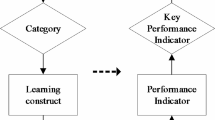Abstract
We might expect a link between educational background, in terms of degree subject studied, and performance on simulation studies. We study this link by comparing the performance of student groups from computer science, statistics and business on a simulation task. The analysis covers their overall performance and their performance on different elements of the task. Surprisingly, we are unable to find much difference in the performance of the students, leading us to conclude that educational background has little effect, at least for a relatively straightforward modelling task. The implications for organisations employing simulation modellers and for their educational needs are discussed.


Similar content being viewed by others
References
Ariss SS and Timmins SA (1989). Employee education and job performance: Does education matter? Public Pers Mngt 18(1): 1–9.
Banks J (2001). Panel session: Education for simulation practice—Five perspectives . In: Peters BA, Smith JS, Medeiros DJ and Rohrer MW (eds). Proceeding of the 2001 Winter Simulation Conference. IEEE: Piscataway, NJ, pp. 1571–1579.
Carson JS (2005). Introduction to modeling and simulation . In: Kuhl ME, Steiger NM, Armstrong FB and Joines JA (eds). Proceeding of the 2005 Winter Simulation Conference. IEEE: Piscataway, NJ, pp. 16–23.
Kruskal W and Wallis WA (1952). Use of ranks in one-criterion variance analysis . J Am Stat Assoc 47(260): 583–621.
Lavigna RJ (1992). Predicting job performance from background characteristics: More evidence from the public sector . Public Pers Mngt 21(3): 347–361.
Law AM (2007). Simulation Modeling and Analysis, 4th edn. McGraw-Hill: New York.
Law A and Schmeiser B (1977). Newsletter of the TIMS College on simulation and gaming, http://www.informs-sim.org/newsletter/oldnewsletters/Vol2No1.pdf, accessed March 2009.
Mason SJ, Hill RR, Mönch L, Rose O, Jefferson T and Fowler JW (2008). Proceedings of the 2008 Winter Simulation Conference . IEEE: Piscataway, NJ.
Nance RE (2000). Simulation education: Past reflections and future directions . In: Joines JA, Barton RR, Kang K and Fishwick PA (eds). Proceedings of the 2000 Winter Simulation Conference. IEEE: Piscataway, NJ, pp. 1595–1601.
Nance RE and Balci O (2001). Thoughts and musings on simulation education . In: Peters BA, Smith JS, Medeiros DJ and Rohrer MW (eds). Proceeding of the 2001 Winter Simulation Conference. IEEE: Piscataway, NJ, pp. 1567–1570.
Paul RJ, Eldabi T and Kuljis J (2003). Simulation education is no substitute for intelligent thinking . In: Chick S, Sanchez PJ, Ferrin D and Morrice DJ (eds). Proceedings of the 2003 Winter Simulation Conference. IEEE: Piscataway, NJ, pp. 1989–1993.
Robinson S (2004). Simulation: The Practice of Model Development and Use . Wiley: Chichester, UK.
Rogers RV (1997). What makes a modeling and simulation professional? The consensus view from one workshop . In: Andradottir S, Healy KJ, Withers DH and Nelson BL (eds). Proceeding of the 1997 Winter Simulation Conference. IEEE: Piscataway, NJ, pp. 1375–1382.
Rohrer M and Banks J (1998). Required skills of a simulation analyst . IIE Solutions 20(4): 20–23.
SIMUL8 (2009). http://www.simul8.com, accessed July 2009.
Stat::Fit (2009). http://www.geerms.com, accessed July 2009.
Szczerbicka H, Banks J, Rogers RV, Ören TI, Sarjoughian HS and Zeigler BP (2000). Conceptions of curriculum for simulation education (Panel) . In: Joines JA, Barton RR, Kang K and Fishwick PA (eds). Proceedings of the 2000 Winter Simulation Conference. IEEE: Piscataway, NJ, pp. 1635–1644.
Tag P and Krahl D (2007). Beyond the university: Simulation education on the Job . In: Henderson SG, Biller G, Hsieh M-H, Shortle J, Tew JD and Barton RR (eds). Proceedings of the 2007 Winter Simulation Conference. IEEE: Piscataway, NJ, pp. 2357–2361.
Author information
Authors and Affiliations
Corresponding author
Rights and permissions
About this article
Cite this article
Robinson, S., Davies, R. An investigation of the effect of educational background on performance in simulation studies. J Oper Res Soc 61, 1685–1693 (2010). https://doi.org/10.1057/jors.2009.151
Received:
Accepted:
Published:
Issue Date:
DOI: https://doi.org/10.1057/jors.2009.151




